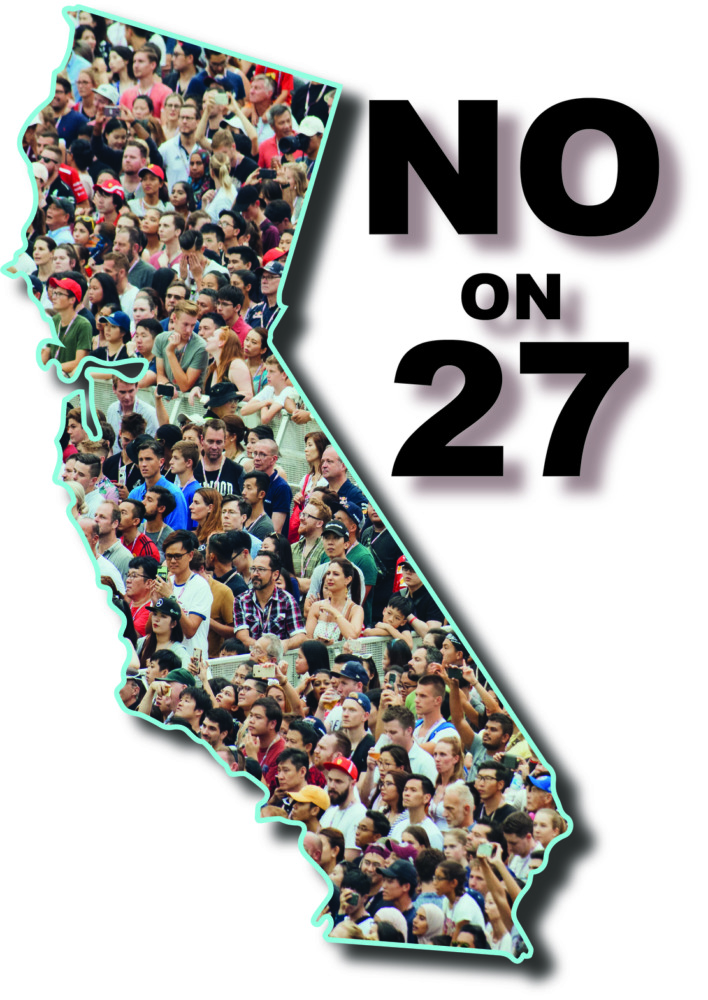Proposition 27 Is Flawed, Native Tribes Should be Listened To
By Emma Pratt
Email: espratt8@mail.ccsf.edu
In the upcoming November election, Californians will be voting on the ever-so-fallacious Proposition 27. If passed, the proposition will make online sports betting legal in California. Whilst online sports betting itself may not be an immediate problem, Proposition 27 is flawed.
The only type of betting allowed in the state currently is casino gambling and cardroom gambling (the latter of which has non-tribal ownership). Casinos in California are owned by federally-recognized Native American tribes and operate on tribal land. The Indian Gaming Regulatory Act was passed in 1988 and is a measure aimed to ensure tribal sovereignty through casino ownership, as stated by The California Legislature’s Analyst’s Office. Casino-style betting games have been legal since the Act, whilst sports betting has remained illegal. Congress gave States the right to determine such legality for themselves in 2018.
Colorado State made online sports betting legal in 2020 with Proposition DD, wrote Connor Mccormick-Cavanagh. Though both the shortcomings and the successes of Colorado’s proposition seem to be overlooked in California’s Proposition 27. Most propositions have an element of public benefit to them, with the aim to persuade a yes vote out of voters. Proposition DD and Proposition 27 have the public benefit of using tax money made from online sports betting for public benefit. Whether or not tax funding is being used merely as a persuasion tactic and not out of genuine care is somewhat irrelevant, so long as the funding is used effectively.

Proposition DD provides funding for The Colorado Water Plan, wrote Mccormick-Cavanagh. The Colorado Water Plan is an extensive plan that is easily researchable online, with fact sheets and intricate drafting plans available to the public, all of which legitimize Colorado’s efficacy in using tax money from online sports betting for Proposition DD’s stated purpose. In contrast, Proposition 27 will (supposedly) use tax money in California from online sports betting for the Homeless Housing, Assistance and Prevention Grant Program, wrote Gabriel Petek in a letter to California’s Attorney General. Petek provides no real implementation plan for such Grant Program, besides writing that it “provides flexible funding to local entities,” based on some criteria. Money, of course, is always needed – but without a secure plan like Colorado has, it’s only right to feel skeptical that Proposition 27’s tax funding is really just a persuasion tactic that may achieve no real goal.
Leading to further skepticism over Proposition 27’s attempt at homeless aid is the ambiguous nature of tax funding. Looking at Proposition DD again as an example, Colorado promised voters that 10% of tax money earned through online sports betting would serve The Colorado Water Plan, wrote Sam McQuillan. The real amount ended up being 4%, with Colorado losing $23 million in tax funding due to tax loopholes, wrote McQuillan. Proposition 27, as written, is full of tax provisions. So whilst it promises that 85% of earned tax money will go to supporting Homelessness in California – we have no answers as to exactly how much funding will be given, due to tax provisions and possible loopholes, said Mary-Beth Molan. It is quite possible California will lose out on much of the tax money earned from online sports betting, as Colorado did.
Most worrisome of all, Proposition 27 would take away tribal sovereignty for many Californian tribes. The ballot measure would introduce out-of-state betting corporations into the state tribal-run industry. These corporations – such as BetMGM, FanDuel, and DraftKings, would partner with Californian tribes in online sports betting ownership, said the Cal Matters 2022 voter guide. However, only 2 tribes outwardly support Proposition 27 on the Yes To Prop 27 website, meaning corporate partnership is not a reality for most and many native Californian tribes.
Over 50 Californian tribes have outwardly shared their disapproval of Proposition 27, in the YES on 26 NO on 27 campaign. Along with Proposition 27, Californians should expect to vote on Proposition 26 in the November elections. Proposition 26 would legalize in-person sports betting as opposed to online, which many tribes favor, as in-person sports betting ensures tribal sovereignty by simply expanding the already existing in-person tribal-owned casinos. Proposition 27 is therefore seen as a measure that may have been created to distract from Proposition 26, and ultimately many tribes’ ability to expand in the industry. If both Propositions 26 and 27 pass, either one could sue the other for being a conflicting proposition, said Grace Gedye. Any proposition found to be in conflict with another cannot go into effect, wrote Gedye.
Tribes in California are working on a proposition for the election in 2024, which like Proposition 27, would advocate legalizing online sports betting. The difference in this 2024 proposition could mean that native tribes end up having more ownership in sports betting online, a position that would be jeopardized by corporate sports betting companies if Proposition 27 passed. Casting a vote that keeps ownership in the hands of native Californian tribes seems well worth the two-year wait.
